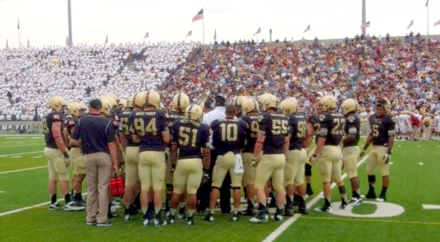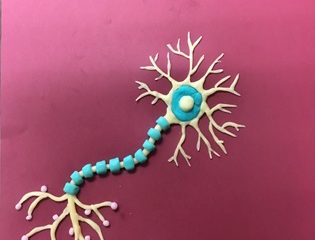
My daughter Karen was ‘on the ground’ at the Army – Boston College Game. The best seat in the house!
Here is what I am reading today:
“UCLA researchers have for the first time measured the activity of a brain region known to be involved in learning, memory and Alzheimer’s disease during sleep. They discovered that this part of the brain behaves as if it’s remembering something, even under anesthesia, a finding that counters conventional theories about memory consolidation during sleep.”
“Researchers at Washington University in St. Louis are inviting the world to take part in an online experiment that will allow participants to see how their individual scores on a face-name memory test compare with those of other test takers.
The test, which can be taken from a computer, smartphone, iPad and other mobile devices, is part of a growing “crowd-sourcing” trend in science, which harnesses the Internet to gather massive amounts of research data while allowing individual study participants to learn a little something about themselves.
To take part, just visit the test website at experiments.wustl.edu”
“According to research from psychological science, it’s both (a) and (b) — while testing can be useful as an assessment tool, the actual process of taking a test can also help us to learn and retain new information over the long term and apply it across different contexts.”
“”Our study shows that BDNF responds completely differently with opioid administration compared to cocaine,” said Ja Wook Koo, PhD, Postdoctoral Fellow in the Department of Neuroscience at Mount Sinai School of Medicine. “Morphine creates reward by inhibiting BDNF, whereas cocaine acts by enhancing BDNF activity.”
BDNF is key to several functions in the brain and peripheral nervous system, notably for making new nerve cells and helping the survival of existing ones. It is also known to activate reward centers in the brain. Cocaine causes an increase in the presence of BDNF in a reward center of the brain called the nucleus accumbens, which results in activation of the reward center.”
“At the Swedish Armed Forces Interpreter Academy, young recruits learn a new language at a very fast pace. By measuring their brains before and after the language training, a group of researchers has had an almost unique opportunity to observe what happens to the brain when we learn a new language in a short period of time.”



5 Comments
LauraGregorich · October 8, 2012 at 3:16 pm
For the Face Memory article, I found it somewhat amusing and interesting. After reading the proposal for the experiment, I was interested in more and went to the website. The online survey took a little less than 10 minutes, and it was interesting to see the score. Given only 2 seconds per a name and face, the subject was expected to do this and remember 56 names and faces. I was pretty surprised I correctly identified many of the faces; usually I struggle in straight memorization rather than learning about it. I think studies like this could be really beneficial for police or identification work, such as recognizing criminals. This could also mean that cramming right before a test might not be such a bad thing. By looking at the material really quickly before an exam, you could reinforce what you already know, and be able to recognize it as a test question if the test had diagrams or other matching-like questions.
crfan_21 · October 15, 2012 at 5:37 pm
I really liked the language learning article. I think that the findings in this article justify high schools and junior highs requirements for their students to take a foreign language. I always get mad when people are seemingly so naturally smart that they don’t have to study very hard to do well. While their IQ level is a large factor, this article reflected the concrete benefits of working your hardest. It is a pretty crazy phenomena that areas of your brain can actually grow as a result of studying really hard. This article makes me curious about the relative brain sizes of people who have been bilingual since childhood.
matthahn · October 17, 2012 at 7:44 pm
The fact that language will cause the brain to grow is no surprise to me. In a way, learning a new language is like learning a new way to think about things. Organizing grammar, choosing the proper phrasing and new vocabulary provide a new window through which to see the world and, in my opinion, probably has a large effect on consistent differences between different countries’ populations.
In my Neuroanatomy class, we discussed a man who was in a construction accident and ended up with six nails in his brain. One nail went directly into Wernicke’s area, destroying some of his language center. The man had previously spoken both English and Spanish, but after the incident , could only speak Spanish. I wonder if there were physical connections in the brain that were lesioned and thus physically removed the way by which he understood both languages.
fionachung. · November 26, 2012 at 5:27 pm
In the article, “Language makes the Brain Grow,” the first thing that popped into my mind is I know several people that know how to speak up to 8 languages, and have learned it at a young age, but since the brain grows as child grows older, does that mean the brain will be bigger than normal or will it be similar to a normal brain? I personally speak 4 languages which means my brain probably grew when I was learning those languages, which probably shouldn’t be a surprise to me after learning so much in this class. I really enjoyed reading the “Face Memory” article. I know many people that can easily recognize and remember people’s faces. I, on the otherhand, am not good at it at all.
CaitlinMorris · November 26, 2012 at 10:22 pm
Online Test Estimates ‘Face-Name Memory IQ’: Simple, 10-Minute Test Scores Ability to Remember Names, Faces
The issue with crowd-sourcing is that although easy and cost effective for gathering a large amount of data, the environment used to test each participant is so variable that it makes it difficult to generalize the results. Furthermore, the significance of this study to a greater cause than simply comparing individuals’ name-face memory score with one another was not made apparent in the article.
Comments are closed.